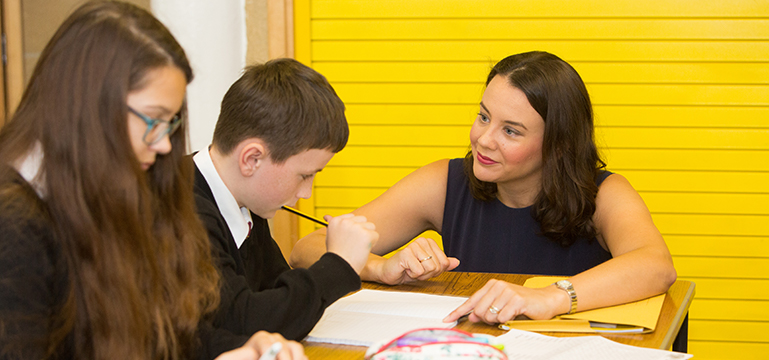An innovative Welsh programme to challenge more able pupils

Quick links:
Information about the school
Treorchy Comprehensive School is an 11 to 18 mixed, community school in Rhondda Cynon Taf. It is an English medium school with significant Welsh provision. The school enables pupils from Welsh language primary schools to continue to study around half of their subjects through the medium of Welsh at key stage 3. There are around 1,680 pupils on roll.
Around 21% of pupils are eligible for free school meals and around 20% of pupils have additional learning needs. Ninety-six per cent of pupils are from a white British background. Around 10% of pupils are fluent in Welsh and around 40% can speak Welsh, but not fluently. Seven per cent of pupils speak Welsh at home.
Context and background to the effective practice
In 2007, Treorchy Comprehensive School became the first school in Wales to achieve the National Association for Able Pupils in Education (NACE) challenge award. Since his appointment in 2011, the headteacher has focused the school’s work on recognising all pupils as individuals and on ensuring that high standards are at the core of the school’s philosophy. All leaders maintain a robust focus on ensuring that they support and challenge those pupils who are more able and talented through a range of effective strategies and provision.
Description of activity/strategy
Leaders have developed highly creative provision to ensure that more able pupils develop extensive Welsh language skills. This fits well with local and national priorities, and the community in which the school sits. For example, leaders’ analysis shows that at least 80% of pupils who attend university remain in Wales, most of whom then continue to work and live in Wales. As a result, the school targets the development of Welsh language skills for more able pupils beneficially.
Staff from the secondary school teach Welsh in the primary feeder schools each week, beginning with pupils in Year 5. After two years of working with these pupils, they are able to identify effectively those who are more able. Liaising with primary leaders and parents, the school places these pupils in a fast-track Welsh programme, Cwrs Carlam. The same teachers work with these more able pupils through their first years in secondary school and pupils progress quickly through the Welsh curriculum. To support this work, teachers in other foundation subjects use an increasing amount of Welsh as the language of instruction in lessons and expect pupils to use their Welsh language skills when writing. As a result, these more able pupils develop their Welsh language skills very well and sit their GCSE examination at the end of Year 9. Results show that nearly all pupils achieve a high grade consistently.
As part of its drive to improve provision and outcomes for more able pupils, leaders listen to and act upon the views of these pupils conscientiously. The school has a strong pupil-voice forum called the more able and talented school council. This council of two pupils from each year-group meets regularly and provides leaders with a beneficial perspective on the school’s provision from a student’s point of view. Pupils are able to bring issues that they consider significant to the attention of school leaders and the school asks their opinion on important issues that may affect more able and talented pupils. For example, leaders ask pupils for feedback on the level of challenge they receive in different lessons and how they think the school could improve. As a result, leaders have made changes in classes and enriched provision in line with the group’s ideas when appropriate. For example, pupils now have more enhanced activities outside of school, such as a visit to a university where more able pupils learn about philosophy and a language day for more able pupils at another secondary school.
Impact on provision and standards
Outcomes in Welsh for more able pupils following the Cwrs Calam programme are consistently high. In 2016, almost two thirds of these pupils achieved an A* or A grade, while 95% secured A* to B grades. In 2017, 85% pupils achieved A* or A grades and 100% of pupils achieved A* to B grades (Welsh Government, 2017c).
Over the last four years, the proportion of pupils achieving five A*-A GSCE (or equivalent) grades is consistently above the average for the family of schools (Welsh Government, 2017c).
Estyn judged that the school provides outstanding learning experiences that meet the needs of all pupils. The school’s Cwrs Carlam provision enables more able and talented pupils to make rapid progress in the development of their Welsh language skills.
More able and talented pupils have very positive attitudes to education and have high expectations of themselves, identifying prestigious universities that they would like to attend and challenging careers to which they aspire.